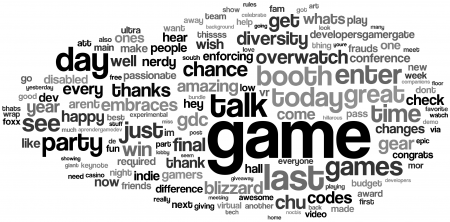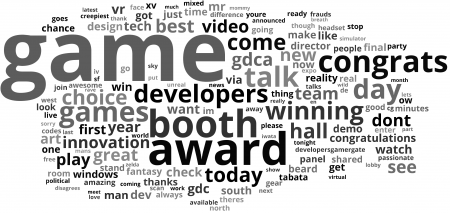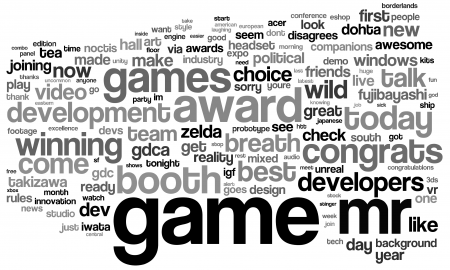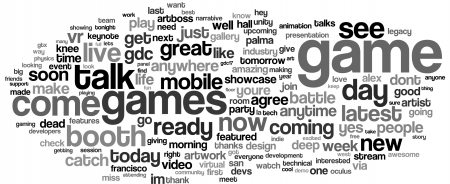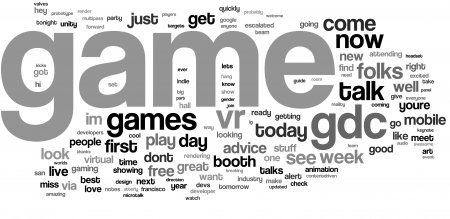Jesper Juul's Blog, page 11
September 8, 2017
Well Played volume 6 number 3
For your theoretical delectation: Well Played: volume 6 number 3

Agency, Identity, Sex, Gender, and Pokémon Go
Allison Bannister
So Close You Can Feel Her
Prostitution, Proximity & Empathy in Grand Theft Auto 5
Elena Bertozzi, Amelia Bertozzi-Villa
Learning at the Farm
Developmental Psychology in Peekaboo Barn
Carly A. Kocurek, Jennifer L. Miller
Taking Over the World, Again?
Examining Procedural Remakes of Adventure Games
Anastasia Salter
August 1, 2017
Game Studies Vol 17, Issue 1
For your theoretical delight, a new issue of Game Studies.
Game Studies: The International Journal of Computer Game Research has just published its latest issue (Volume 17, Issue 1, July 2017). All articles are available at www.gamestudies.org/1701
Articles
Watching People Is Not a Game: Interactive Online Corporeality, Twitch.tv and Videogame Streams
by Sky LaRell Anderson
This article examines Twitch.tv in order to reveal the design strategies it employs to direct awareness to the presence of players and viewers. Specifically, I describe the elements that direct attention toward humans, persons and personalities outside of games.
Glory to Arstotzka: Morality, Rationality, and the Iron Cage of Bureaucracy in Papers, Please
by Jason J. Morrissette
This article examines how ludic and thematic elements coalesce in Papers, Please to replicate the monotony of bureaucratic work, trapping players in Weber’s iron cage of bureaucracy. Moreover, by offering opportunities to deviate from administrative protocols, the game highlights the inherent tension between morality and bureaucratic rationality.
Abstracting Evidence: Documentary Process in the Service of Fictional Gameworlds
by Aaron Oldenburg
This paper looks at a strategy for creating content and gameplay using documentary processes such as interviews and on-location evidence collection for games that abstract that content with varying levels of fictionalization.
An Enactive Account of the Autonomy of Videogame Gameplay
by Jukka Vahlo
In this paper, the phenomenon of videogame gameplay is analyzed from an enactive view of social cognition. It is asserted that videogame gameplay arises as an autonomous organization in the reciprocal dynamics between at least one social agent and a responsive game. This autonomy is argued as both original and irreducible to its constituents.
April 20, 2017
Nordic Game Jam – the original 2006 plan
 Today is the start of the 12th installment of the Nordic Game Jam.
Today is the start of the 12th installment of the Nordic Game Jam.
Going through my old files, here is the draft document describing the first “Nordic Game Jam” (yes, quotes) in 2006, which was organized by Henriette Moos, Gorm Lai and me.
By now, the language is positively quaint, patiently explaining that it’s about “making a game in a weekend”, and framing it as a workshop.
Nordic Game Jam is a weekend workshop in January 27-29th 2006 at the IT University in Copenhagen, Denmark. The workshop is about “making a game in a weekend”, dealing with game design and technical issues, and meeting other people working with game design and development.
This was not the first game jam to be held, but it was possibly the first to be centered around teams, rather than around individual programmers. This was a departure from the single-programmer and engine-oriented style of the Indie Game Jam, which I’d been to in 2005.
During the next few years, the Nordic Game Jam helped the broad acceptance of the game jam format, and it’s in part responsible for the incredible glut of indie and experimental games that we see today.
Compare today’s environment with the fact that my mere participation in the 2005 Indie Game Jam was enough to make my game shown at the Experimental Gameplay workshop at GDC. Doesn’t work like that anymore.
I remain extremely happy to have participated in making the Nordic Game Jam happen.
March 4, 2017
Game Developers Conference 2017 in tweets: March 3rd #gdc17
Continued from yesterday’s survey of Game Developers Conference 2017 tweets, here are the most common words on the #gdc17 twitter hashtag for March 3rd 2017, fifth and final day of the conference:
Michael Chu of Blizzard gets the most mentions, quoted for saying that Blizzard embraces diversity in Overwatch.
And last day, of course.
And those were the main themes on Twitter.
Time: The first time I did this, a mere 8 years ago, Twitter wasn’t yet an integral part of the communication strategy of every company on the planet, so it felt more like these word clouds were revealing something fundamental about the conference.
Today, Twitter has to be approached with some skepticism. I have had to remove the endless stream of tweets that concerned the promise of prizes for everyone retweeting a particular tweet. And you never know how many accounts are real, and how many are puppets made for whatever reason.
But still: This GDC had no dominant theme.
March 3, 2017
Game Developers Conference 2017 in tweets: March 2nd #gdc17
Continued from yesterday’s survey of Game Developers Conference 2017 tweets, here are the most common words on the #gdc17 twitter hashtag for March 2nd, 2017, the fourth day of the conference:
Still congratulations for the Developer Choice Awards.
“Innovation” comes from a snarky retweeted messages to No Man’s Sky makers Hellogames: “CONGRATULATIONS ON YOUR GAME DEVELOPERS CHOICE AWARD FOR INNOVATION ᵃᵖᵒˡᵒᵍᶦᶻᵉ”.
“Creepiest” refers to a face-scanning technology.
The Final Fantasy XV tech demo video is mentioned.
And “party”.
So still no standout story or theme. Some years have a theme on Twitter, some don’t.
March 2, 2017
Game Developers Conference 2017 in tweets: March 1st
Continued from yesterday’s survey of Game Developers Conference 2017 tweets, here are the most common words on the #gdc17 twitter hashtag for March 1st, 2017, the third day of the conference:
Today: Game Developer Choice Awards, with lots of congratulations.
Biggest talk was Nintendo on Legend of Zelda: Breath of the Wild, by Hidemaro Fujibayashi, Satoru Takizawa and Takuhiro Dohta, whose names show up.
Windows and Acer are mentioned for mixed reality headsets. (The MR refers to the Nintendo presenters though, not Mixed Reality.)
Noctis from Final Fantasy XI also makes it.
March 1, 2017
Game Developers Conference 2017 in tweets: February 28
Continued from yesterday’s survey of Game Developers Conference 2017 tweets, here are the most common words on the #gdc17 twitter hashtag for February 28, 2017, the second day of the conference:
Again, no dominant topic, but booths, showcases, artwork, mobile, VR.
February 28, 2017
Game Developers Conference 2017 in tweets: February 27
As part of my Game Developers Conference tweet series, here are the most common words on the #gdc17 twitter hashtag for February 27, 2017, the first day of the conference:
This suggests a conference with no dominant theme.
VR and Mobile stand out, but then there are specific events for those happening these two first days.
VR is a less popular tag now than the same day, last year.
PS. I’ve filtered out the tweets where unnamed companies were promising prizes for retweets. This is also what Twitter is becoming.
January 19, 2017
The Darkening of Play
These are some comments from my keynote at Rutger’s Extending Play conference in 2016, co-presenting with Shaka McGlotten.
Hasn’t our sense of play suddenly become quite dark?
 There is a change in our primary conceptions of playing, and game-playing. In Brian Sutton-Smith’s Ambiguity of play, he lists 7 common rhetorics of play, meaning 7 common ways in which play is framed.
There is a change in our primary conceptions of playing, and game-playing. In Brian Sutton-Smith’s Ambiguity of play, he lists 7 common rhetorics of play, meaning 7 common ways in which play is framed.
When the field of game studies began, we probably used four quite positive rhetorics of play:
Rhetoric of play as progress.
Rhetoric of play as fate.
Rhetoric of play as power.
Rhetoric of play as identity.
Rhetoric of play as the imaginary.
Rhetoric of the self.
Rhetoric of play as frivolous.
This is not surprising. The field of game studies started out arguing against negative views of video games (“they make children crazy!”), and we therefore celebrated play, and games.
We emphasized learning (play as progress), playing with identity, we emphasized the positive creations of the imaginary, and we emphasized the me-time of playing (the self).
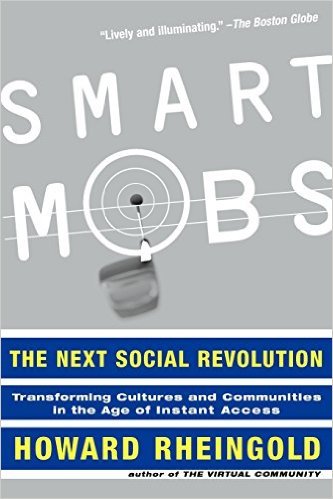 But now it seems we are in a darker place. This became clear to me when I rediscovered Howard Rheingold’s 2002 book Smart Mobs. Compared to this book, there is a distinct dystopian feeling now. We rarely discuss internet or game culture as something positive.
But now it seems we are in a darker place. This became clear to me when I rediscovered Howard Rheingold’s 2002 book Smart Mobs. Compared to this book, there is a distinct dystopian feeling now. We rarely discuss internet or game culture as something positive.
We no longer talk about smart mobs, just mobs.
We discuss game culture as a problem, and we think of self-organized online groups as dangerous, both in games, and in, ahem, politics.
Returning to Sutton-Smith, the primary framing of play now seems one of power and domination. Play now appears to be a dark place from which grows discrimination, dominance, and threats of violence.
Rhetoric of play as progress.
Rhetoric of play as fate.
Rhetoric of play as power.
Rhetoric of play as identity.
Rhetoric of play as the imaginary.
Rhetoric of the self.
Rhetoric of play as frivolous.
My hope is simple: I hope we can keep our focus here, that we can be aware of what is happening and do what we can to change things. But also that we don’t become the school that bans recess for fear of lawsuits. That we can be aware of what is happening in the world around us, while we still remember the good sides of play.
January 9, 2017
Game Studies Volume 16, Issue 2
For your theoretical gratification:
New Special Issue of Game Studies Journal
Game Studies: The International Journal of Computer Game Research has just published its latest issue (Volume 16, Issue 2, December 2016). All articles are available at
www.gamestudies.org/1602
Editorial
War/Game: Studying Relations Between Violent Conflict, Games, and Play
by Holger Pötzsch, Philip Hammond
War and games are intrinsically connected. The present editorial maps the war/game nexus, locates the issue in academic discourse, and briefly introduces each contribution included in this special issue of Game Studies.
Articles
Contested Memories of War in Czechoslovakia 38-89: Assassination: Designing a Serious Game on Contemporary History
by Vít Šisler
This article investigates the possibilities and limitations of videogames in dealing with contentious issues from contemporary history; particularly the civilian perspective of war. It presents a serious game we developed, Czechoslovakia 38-“89: Assassination, and critically discusses the design challenges of adapting real people’s testimonies.
This Uprising of Mine: Game Conventions, Cultural Memory and Civilian Experience of War in Polish Games
by Piotr Sterczewski
The article analyses the representations of civilian experience of war in three Polish games depicting the Warsaw Uprising, focusing on relations between discourses of Polish cultural memory and dominant game medium conventions.
It’s Hard to Play in the Trenches: World War I, Collective Memory and Videogames
by Adam Chapman
This article explores the relation of WWI popular collective memory to videogames and thus their nature as a form for historical representation. Providing an overview of WWI videogames, it suggests that their lack of engagement with WWI popular memory is partly shaped by the pressures that the videogame form and its perceived cultural role entail.
“eXplore, eXpand, eXploit, eXterminate”: Affective Writing of Postcolonial History and Education in Civilization V
by Dom Ford
This article considers Civilization V through a postcolonial lens. It problematizes the homogenous historical narrative the game creates, and analyses the player’s relationship with that history, while questioning the use of the series in education.
“Honestly, I Would Stick with the Books”: Young Adults’ Ideas About a Videogame as a Source of Historical Knowledge
by Kevin O’Neill, Bill Feenstra
Twelve Canadian university students played Medal of Honor: Frontline and were interviewed about how “realistic” they thought the game was. Our paper details the strategies players used to make this judgment, and attempts to explain why they thought of commercial videogames as less useful sources of knowledge about the past than any other media.
The Positive Discomfort of Spec Ops: The Line
by Kristine Jørgensen
The article is a study of how focus-group participants describe their experiences with playing the third- person military shooter Spec Ops: The Line (Yager Entertainment, 2012), and identifies three techniques used by the game to create a positive sense of discomfort.
Proving Grounds: Performing Masculine Identities in Call of Duty: Black Ops
by Gareth Healey
This article focuses on the ways in which adolescent boys use sexualized language and bragging to construct their masculine identities when playing Call of Duty: Black Ops (Treyarch, 2010).
Diversion Drives and Superlative Soldiers: Gaming as Coping Practice among Military Personnel and Veterans
by Jaime Banks, John G. Cole
This multi-method study explores military and veteran gamers’ self-directed coping through video games and avatars. Results suggest coping practices are associated with more general motivations for play, avatars support identity-related coping, and fantasy and skill motivations are uniquely tied to coping for those with chronic mental/physical conditions.
War, Games, and the Ethics of Fiction
by Lykke Guanio-Uluru
Drawing on Espen Aarseth’s discussions of cybertext and ludo-narratives, on rhetorical narrative theory and on Miguel Sicart’s conception of the ethics of computer games, this article analyzes the portrayal of war technology, the nature games and ethical responsibility in three popular fictions.

